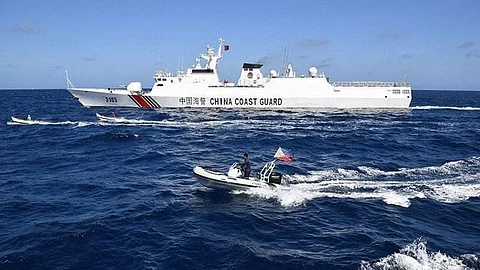
- NEWS
- the EDIT
- COMMENTARY
- BUSINESS
- LIFE
- SHOW
- ACTION
- GLOBAL GOALS
- SNAPS
- DYARYO TIRADA
- MORE

The Philippines has bolstered its maritime security alliances with international partners as tensions in the West Philippine Sea (WPS) continued to persist over the weekend.
This as diplomats from France, Japan, the European Union, Vietnam, Indonesia and Australia reaffirmed their commitment to safeguarding regional stability and maritime sovereignty.
French Ambassador Marie Fontanel underscored her country’s support for the Philippines, highlighting several recent milestones, including France’s participation in the 39th Balikatan Exercises, the deployment of the Pegase 24 Air and Space Force, and the establishment of a dedicated defense mission in Manila in June.
“For an archipelagic nation like the Philippines, maritime safety is crucial. Ensuring the efficient transport of people and goods is essential for economic prosperity, while territorial and maritime sovereignty are vital for national security,” Fontanel said.
Japanese Ambassador Endo Kazuya reaffirmed Japan’s dedication to upholding international law under the United Nations Convention on the Law of the Sea (UNCLOS).
“Japan stands ready to work closely with the Philippines, ASEAN, and the international community to advance a Free and Open Indo-Pacific,” he said.
European Union Ambassador Massimo Santoro stressed the importance of maintaining a rules-based order in the Indo-Pacific.
“A region free from coercion is key to our collective stability, peace, and prosperity. Strategic partnerships are central to the EU’s approach to the Indo-Pacific, promoting cooperation over confrontation,” Santoro explained.
Ambassadors from ASEAN nations also voiced their support. Indonesian Ambassador Agus Widjojo called for enhanced regional maritime cooperation, while Vietnamese Ambassador Lai Thai Binh stressed the shared imperative of maritime security.
“For Vietnam and the Philippines, maritime security is not just a matter of national interest but a shared regional imperative. Addressing these complex challenges requires robust partnerships and a steadfast commitment to upholding international law, particularly the UNCLOS,” Binh said.
Australia also deepened its engagement with the Philippines, as Acting Ambassador Dr. Moya Collett announced the country’s participation in the Talisman Sabre exercise, the largest military drill in the southern hemisphere.
“Maritime security and territorial defense are now core pillars of Australia’s Defense Cooperation Program, evolving in response to the Armed Forces of the Philippines’ needs,” Collett said, highlighting joint exercises like Balikatan and Exercise ALON to enhance interoperability.
On Sunday, the Philippine Coast Guard (PCG) condemned China’s alleged attempts to impose a “new order” in the WPS. Commodore Jay Tarriela, the PCG’s spokesman for the WPS, accused the China Coast Guard of conducting unlawful operations near the Philippines’ coastline.
“The Philippine Coast Guard will not tolerate actions that violate international law and threaten our sovereignty,” Tarriela declared.
The PCG accused China of using strong acoustic weapons against Philippine vessels last week.
China and the Philippines are locked in a territorial dispute in the South China Sea, which overlaps the West Philippine Sea.
Beijing asserts its expansive “nine-dash line,” encompassing nearly the entire sea, while the Philippines claims areas within its Exclusive Economic Zone (EEZ) under the United Nations Convention on the Law of the Sea.
In 2016, the Permanent Court of Arbitration in The Hague ruled in favor of the Philippines, invalidating China’s claims and affirming the Philippines’ sovereign rights to resources in its EEZ.
However, China has rejected the ruling and continues militarization and resource exploitation, escalating tensions in the region.
